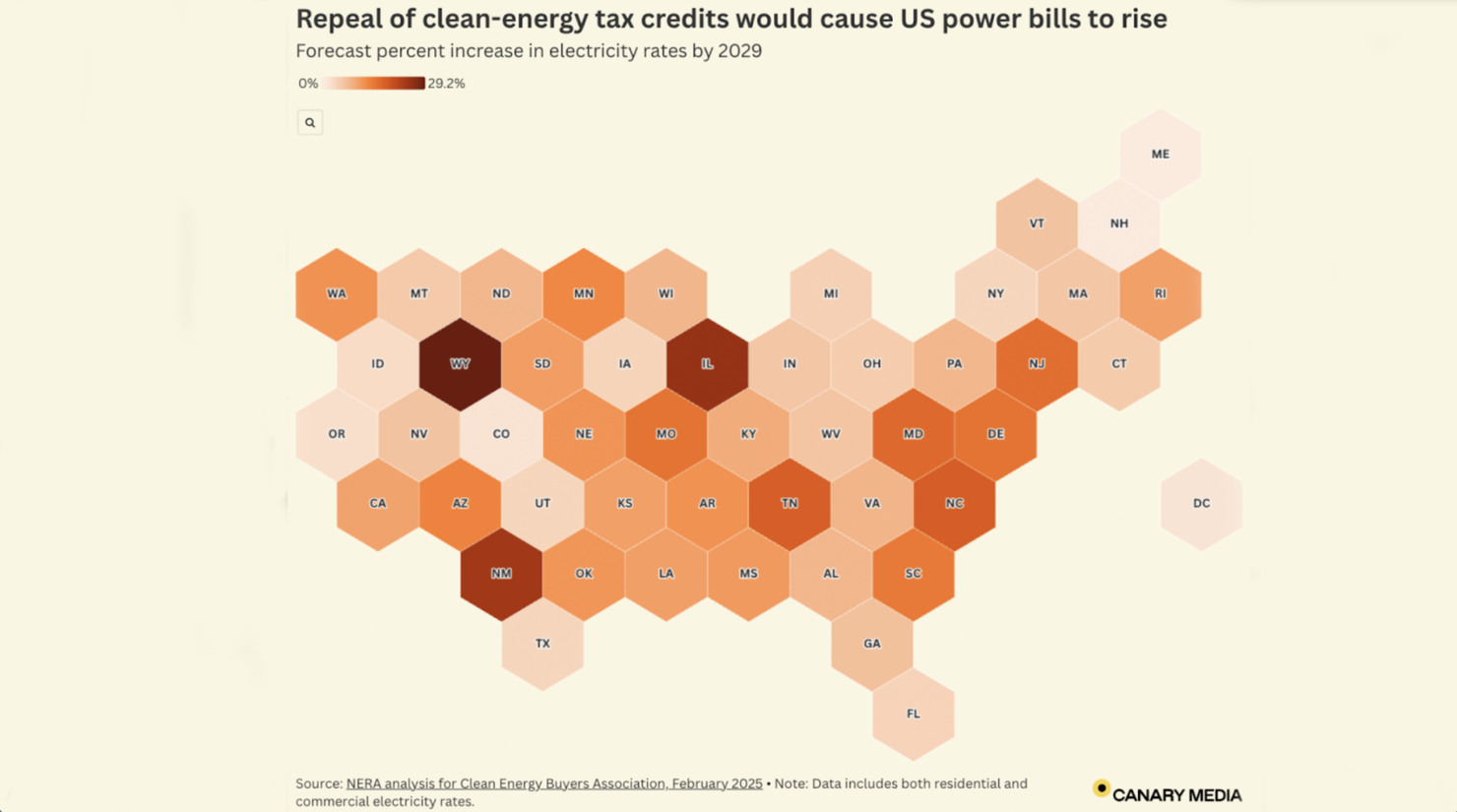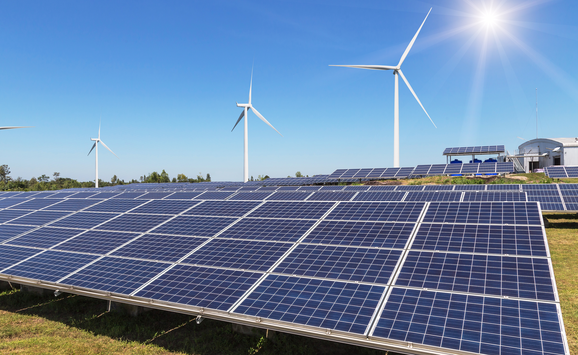Highlights
🌎 Stalled US Decarbonization Jeopardizes International Competitiveness
💪 US States Strengthen Regional Carbon Commitments
🚘 Checking Up on Carbon Pricing: What’s The Policy Outlook?
💡Heating or Eating: Energy Insecurity Forces Americans to Choose
💵 Bigger Bills: Loss of Clean Energy Tax Credits May Increase Utility Bills

Twice a month, we’re compiling the most relevant news stories from diverse sources online, connecting the latest environmental and energy economics research to global current events, real-time public discourse, and policy decisions. Keep reading, and feel free to send us your feedback.
Here are some questions we’re asking and addressing with our research chops this week:
Will the cancellation of decarbonization projects affect US competitiveness in global markets?
The European Commission recently authorized funding for six new industrial-decarbonization projects (adding up to more than 80 such projects in total) as part of its plan to invest in innovative decarbonization technologies—an initiative which has a budget of €4 billion. As the European Union increases its investment in decarbonization projects, the United States is pulling back. The Trump administration has been canceling investments in clean energy, and the US Department of Energy recently terminated 24 awards for industrial-decarbonization projects. In a new If/Then blog post, Resources for the Future (RFF) Fellow Alan Krupnick and RFF Research Associate Katarina Nehrkorn analyze the potential impacts of these cancellations on innovation, emissions reductions, and US competitiveness in a decarbonizing global market. “At a moment when global clean energy leadership is up for grabs, the decision to pull support from US clean energy projects midstream could detract from American prospects for future innovations and carbon dioxide reductions,” say Krupnick and Nehrkorn.
How will a recent update to a regional cap-and-invest initiative help climate-conscious US states achieve their goals for clean electricity and energy affordability?
Zohran Mamdani, the Democratic nominee for mayor of New York City, recently affirmed his support for an ambitious climate law that requires efficiency upgrades in buildings to curb greenhouse emissions. Elsewhere, the governor of Maine signed a new bill into law in June which requires that 90 percent of the state’s energy production come from renewable resources by 2040, and the Massachusetts state legislature recently introduced a new bill that directs the state’s Department of Transportation to comply with emissions targets. These efforts by individual states to decarbonize are complemented by the Regional Greenhouse Gas Initiative (RGGI), a cooperative effort to reduce emissions in New York, Maine, Massachusetts, and seven other mid-Atlantic and Northeastern states. In a new blog post, RFF Fellow Dallas Burtraw and coauthor Franz Litz examine the updates proposed in a recent RGGI program review that aim to promote energy affordability and yield revenues that enable investments to accelerate states toward their clean energy targets. “The RGGI program update provides an elegant model and demonstrates the continuing success of a cooperative multi-state process that may entice other states to align with or join the cap-and-invest program,” say Burtraw and Litz.
How prevalent are carbon pricing policies across the world as a tool to reduce greenhouse gas emissions?
A new report from the World Bank finds that some type of carbon price is applied to 28 percent of global emissions. Carbon pricing is a policy instrument that puts a cost on carbon emissions to encourage emitters and consumers to reduce their carbon footprint, and it’s been implemented in various countries across the world. A recent survey has found that a majority of people in affluent countries support a carbon tax—though the United States has been slow in its uptake. In a new episode of Resources Radio, Danny Richter, director of the Pricing Carbon Initiative, discusses the history, uptake, and versatility of carbon pricing as a policy option. “[Carbon pricing] gives you so much flexibility to tweak how you place that price, where you place that price, and then total freedom in what you do with the revenue,” says Richter. “You can meet so many different political moments, so many different contexts.”

Resources Roundup

Upcoming Event: Changes in Public Land Policies
Recent federal decisions, including provisions in the budget reconciliation bill and several executive orders, will dramatically change public land management in the United States. Public lands have significant economic and environmental importance as drivers of the outdoor recreation economy and as sources of revenue from oil and gas leasing and other natural resources. Join RFF experts next week Wednesday, July 30, for a webinar that will explore the implications of policy changes for federal lands. Moderated by E&E News reporter Ian Stevenson, the group will discuss recent If/Then analyses of the road ahead for public lands, agency staffing reductions, timber harvesting, oil and gas leasing, and national monument designations. Register for the event here.
Will More Timber Harvesting on Federal Lands Reduce Wildfire Risk?
In March 2025, President Trump issued an executive order directing the Secretaries of Agriculture and the Interior to increase timber production on federal lands for two stated goals—expanding the timber supply and addressing rising wildfire risks. In their recent report, RFF Fellow Matthew Wibbenmeyer and Senior Fellow David N. Wear analyze historical timber harvest data and current forest-management needs to ask: What would be the effect on wildfire risk if federal land-management agencies increased harvests by 25 percent? To answer this question, Wibbenmeyer and Wear evaluate the potential for selective harvesting to reduce wildfire risk, given the constraints imposed by the timber market and declining federal capacity to implement nuanced, site-specific forest treatments.

Heating or Eating: Energy Insecurity Forces Americans to Make Impossible Choices
Energy insecurity—the inability to access or afford sufficient energy to meet basic household needs—is a persistent issue for millions of people in the United States. On the Resources Radio podcast, Columbia University Associate Professor Diana Hernández highlights the struggles that everyday Americans face to meet their energy needs, along with possible policy solutions. Hernández shares stories from her recently released book, Powerless: The People’s Struggle for Energy, which highlights the highly personal nature of energy insecurity and the lived experiences of families that are forced to choose between heating and eating, endure unsafe living conditions, and navigate a broken energy safety net. Hernández recently joined RFF to share insights from Powerless at a book talk cohosted by RFF and Columbia’s Center on Global Energy Policy.
Smart Recycling Policies Could Unlock a Circular, Globalized Economy
Recycling isn’t just an individual practice; it’s a key touchstone in global efforts to develop a circular economy and conserve nonrenewable resources. However, recycling on a global scale is not without challenges. The type and location of waste generated by consumption doesn’t always align with what and where the needs are for reusing recycled materials in new products, particularly in the context of global trade—a phenomenon called “mismatch,” which can prevent effective recycling. In a new working paper from the RFF-CMCC European Institute on Economics and the Environment, researchers Eugénie Joltreau and Luis Sarmiento demonstrate how smart local recycling policies can help reduce mismatches between consumers and producers, providing a new perspective on recycling in a globalized economy.
Satellite Data Aligns Conservation and Business Goals by Protecting Whales and the Shipping Industry
Blue whales in the northeastern Pacific Ocean face an unexpected threat: collisions with ships that operate in the Exclusive Economic Zone of the United States. These ship strikes lead to whale mortality and damage the vessels themselves; improved whale-tracking satellite technology can help reduce such collisions. RFF Fellow Yusuke Kuwayama, Nonresident Fellow Richard Bernknopf, and collaborators Andrew Steinkruger and Sophie Pesek have estimated the economic value of satellite data for conserving Eastern North Pacific blue whales at $11 million–$636 million per year. Their recent journal article is a product of the VALUABLES Consortium, a recently completed research collaboration between RFF and NASA. The authors show how remote sensing helps vessels avoid collisions with blue whales, producing cost savings for vessel operators and supporting goals for ocean conservation.

#ChartOfTheWeek

Source: Canary Media and NERA analysis for Clean Energy Buyers Association, February 2025
Earlier this month, President Donald Trump signed the federal budget reconciliation bill, which phases out tax credits for clean energy that had reduced the costs of clean energy projects, such as building out the infrastructure for clean electricity projects. Eliminating these tax credits therefore is expected to cause a significant increase in household energy bills. According to a recent analysis, repealing these tax credits could increase energy costs for consumers nationwide. The sharpest increases are expected in Illinois, New Mexico, and Wyoming, with prices in Wyoming expected to rise by as much as 29.2 percent.








